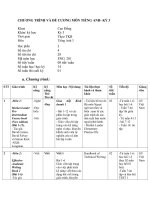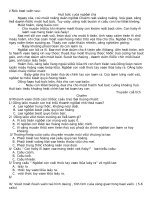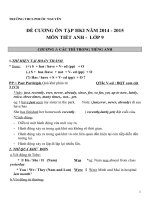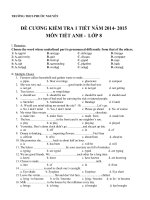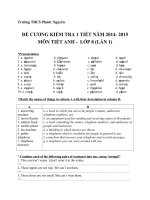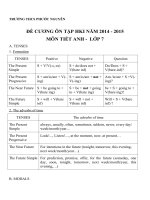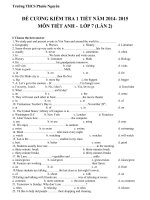đề cương môn tiếng anh (1)
Bạn đang xem bản rút gọn của tài liệu. Xem và tải ngay bản đầy đủ của tài liệu tại đây (196.56 KB, 23 trang )
TRƯỜNG THCS PHƯỚC NGUYÊN
ĐỀ CƯƠNG ÔN TẬP HKI NĂM 2014 - 2015
MÔN TIẾT ANH - LỚP 9
CHƯƠNG 1: CÁC THÌ TRONG TIẾNG ANH
1.THÌ HIỆN TẠI HOÀN THÀNH.
* form:
(+) S + has / have + V- ed (pp) + O
(-) S + has /have + not + V- ed (pp) + O
(?) Has / have + S + V- ed (pp) + O ?
PP = Past Participle Quá khứ phân từ
3 (V3)
QTắc V-ed : BQT xem cột
*Adv: just, recently, ever, never, already, since, for, so far, yet, up to now, lately,
twice, three times, many times,. not…yet.
eg: I have just seen my sister in the park.
sau have/has
Note: (just,ever, never, already) đi
She has finished her homework recently.
( recently,lately,yet) đặt cuối câu.
*Cách dùng:
- Diễn tả một hành động vừa mới xảy ra.
- Hành động xảy ra trong quá khứ mà không rõ thời gian.
- Hành động xảy ra trong quá khứ và còn liên quan đến hiện tại còn tiếp diễn đến
tương lai.
- Hành động xảy ra lặp đi lặp lại nhiều lần.
2. THÌ QUÁ KHỨ ĐƠN
a.Với động từ Tobe:
* I/ He / She / It (Nam)
yesterday
Was
*eg: Nam was absent from class
* You / We / They (Nam and Lan) Were " Were Minh and Mai in hospital
last month?
b.Với động từ thường:
1
*form: (+) S + V- ed/(V2 BQT) + O
*eg: Tom went to Paris last summer.
Câu phủ định và nghi vấn ta phải mượn trợ động từ did
(-) S + did not + Vinf + O
" He did not watch TV last night.
(?) Did + S + Vinf + O ? " Did you go to HCM city two days ago?
Adv:
Yesterday, ago, last (week/month/ year/ … )
c.Cách dùng :
- Diễn tả một hành động đã xảy ra trong quá khứ và chấm dứt hẳn trong QK
3.THÌ QUÁ KHỨ TIẾP DIỄN
* form
(+) S + Was/ were + V- ing + O
(-) S + Was/ were + not + V- ing + O
(?) Was/ were + S + V- ing + O?
Cách dùng :
- Diễn tả một hành động đang xảy ra trong quá khứ tại 1 thời điểm xác định cụ
thể.
- => I was doing my homework at 6 p.m last Sunday.
- Diễn tả hai hay nhiều hành động cùng xảy ra trong quá khứ. (While)
- => I was cooking while my sister was washing the dishes.
- Diễn tả một hành động xảy ra thì một hành động khác đến cắt ngang.(When)
- => When the teacher came, we were singing a song.
CHƯƠNG 2: CÂU ĐIỀU KIỆN
I. Lý thuyết.
- Một câu điều kiện thường có hai mệnh đề là mệnh đề chính và mệnh đề phụ(If) .
Mệnh đề phụ (If)có thể đặt trước hoặc sau mệnh đề chính.
- Có 3 loại câu điều kiện:
1.Câu điều kiện 1: điều kiện có thể xảy ra .
* form:
MỆNH ĐỀ IF
Simple present( HTđ)
MỆNH ĐỀ CHÍNH
Simple future( TLđ)
If + S + V(HT) +O , S + Will/ Shall + V(inf) + O
2
If I have time, I shall visit you.
John usually walks to school if he has enough time.
If she eats much, she will be overweight.
2. Câu điều kiện 2 : điều kiện không có thật ở hiện tại.
* form :
MỆNH ĐỀ IF
Past simple (QKĐ)
MỆNH ĐỀ CHÍNH
,
would/could/ should/ might + Vinf
If + S + V–ed (V2) + O, S + would/ could + V(inf) + O
*Note: Tobe dùng Were cho tất cả các ngôi ( trong Mệnh đề If)
* eg: If I had much money , I would buy a new bicycle.
If you practised English every day , you could speak it fluently.
If I were you, I would not tell him about that.
3.Note: Unless = if…not ( nếu không, trừ khi )
Eg: Unless it rains, we will go to the movies.= ( If it does not rain , we will go to
the movies
4.Bảng tóm tắt câu điều kiện.
Loại Mệnh đề phụ(IF)
1
Will
V(HTĐ)
Can
Be (is/am/are)
Đt thường
2
3
Mệnh đề chính
V inf/ V(s/ es)
Quá khứ đơn (bàng thái)
+ V (inf)
Shall
May
Could
Be " WERE
Would
Đt thường V- ed /
( V2)BQT
Should
QKHT (bàng thái)
Could
+ V (inf)
Might
3
Had + V- ed(V3)
BQT
Would
ed( pp)
+ have + V-
Should
CHƯƠNG 3. CÁCH DÙNG ĐỘNG TỪ “ WISH”
I.
Lý thuyết.
- Động từ Wish = If only (ao ước) thường dùng để diễn tả những ước muốn,
những điều không có thật hoặc rất khó thực hiện.
- Có 2 loại câu ước.
1. Future wish:( ước muốn ở tương lai)
* form: S1 + wish + S2 + would/ could + V(inf) + O.
If only + S + would/ could + V(inf) + O
* eg:- I wish I would be an astronaut in the future.
- Tom wishes he could visit Paris next summer.
- If only I would take the trip with you next Sunday.
2. Present wish( ước muốn ở hiện tại)
* form:
S1 + wish + S2 + V- ed
+ O
Were
+ adj / n
Could
+ V (inf)
*Note: Tobe dùng Were
cho tất cả các ngôi
* eg:- I wish I were rich (but I am poor now)
- I can’t swim. I wish I could swim.
- If only Ben were here ( but Ben isn’t here. I wish he were here)
- We wish that we didn’t have to go to class today ( but we have go to class
today)
CHƯƠNG 4: CÂU BỊ ĐỘNG (THE PASSIVE VOICE)
A. Lý thuyết.
• Quan sát:
4
- Câu chủ động: Mr Smith teaches English. (Active)
- Câu bị động: English is taught by Mr Smith. (Passive)
• Qui tắc:
- Tân ngữ chủ động " chủ ngữ bị động
- Động từ bị động
Be + Past Participle (pp)
- Chủ ngữ chủ động " tân ngữ bị động ( trước có giới từ by chỉ tác nhân)
*Note: by them/ by people/ by someone …. Bỏ
• Sơ đồ:
S
V
S
be + V-ed (pp)
O (Active)
by + O (Passive)
Bảng tóm tắt công thức các thì trong câu bị động.
HTĐ
Am, is, are
+
V- ed (pp)
QKĐ
Was, were
+
V- ed (pp)
HTTD
Am,is, are
+
being
+
V- ed (pp)
QKĐD
Was, were
+
being
+
V- ed (pp)
HTHT
Have, has
+
been
+
V- ed (pp)
MODEL
VERBS
Can,may,might,should,will
Have to, used to,
+
be + V- ed (pp)
Cách đổi: Bước 1: Lấy Tân ngữ (O) câu chủ động xuống làm Chủ từ (S)câu bị động.
Bước 2: a/ Lưu ý Động từ câu chủ động ở thì nào To Be ở ngay thì đó.
b/ Động từ chính đổi sang dạng PP (QK phân từ)
Bước 3: Lấy Chủ từ (S)câu chủ động xuống làm Tân ngữ (O)câu bị động đặt
sau By chỉ tác nhân.
*eg:
I learn English everyday.( Active)
=> English is learnt by me everyday. (Passive)
5
CHƯƠNG 5: CÂU TRỰC TIẾP – GIÁN TIẾP
A. Lý thuyết. - Lời nói gián tiếp là tường thuật lại ý của người nào đó nói.
• Cách đổi câu trực tiếp sang câu gián tiếp:
1. Thay đổi thì của động từ.
Trực tiếp (Direct speech)
Gián tiếp (Reported
speech)
HTĐ ( is/are/ am)
QKĐ (was/were)
HTTD ( is/are/am + V- ing) QKTD(was/were + V- ing)
TLĐ ( Will )
TL trong QK ( Would )
Can
Could / be able to
Shall
Should
Must
Had to / would have to
Have to
Had to
Will
Would
2. Thay đổi chủ ngữ, tân ngữ, đại từ sở hữu.
- Ngôi thứ nhất: (I, we, me, mine, us, our) được đổi sang ngôi thứ ba (He, She, It,
They, him/her, his/ hers, its, their, them) phù hợp.
*eg: Jane said,” I live in the suburbs”
" Jane said that she lived in the suburbs.
- Ngôi thứ hai ( You, your, yours ) được đổi theo ngôi của tân ngữ trong mệnh đề
tường thuật.
*eg: He said to me,” You can take my book”
" He said me that I could take his book.
- Ngôi thứ ba ( He, She, It, They, him, his, her ,them ,their) giữ nguyên( không
đổi).
6
*eg: Mary says,” They come to help the pupils.”
" Mary said that they came to help the pupils.
3.Trạng từ chỉ thời gian .
Trực tiếp (Direct
speech)
Gián tiếp (Reported speech)
now
then
ago
before
today
that day
tonight
that day
tomorrow
the next day/ following day
yesterday
the day before
last week/month/year
the previous week/month/year
next week/month/year
the following week/month/year
*eg: - “I’m going now”. He said
" He said he was going then.
- She said “ I was at Hue yesterday”.
" She said that she had been at Hue the day before.
4.Trạng từ chỉ nơi chốn.
Trực tiếp (Direct
speech)
Gián tiếp (Reported
speech)
here
there
this
that
these
those
7
*eg:- He said,”Put the books here”
" He told me to put the books there.
- Tom said to me,” I’ll meet you this Friday”
" He told me that he would meet me that Friday.
I. Câu mệnh lệnh gián tiếp
* Công thức: TT:“V + O” =>
to-inf…
GT: S + told/ordered/asked + O +
TT “Don’t/ doesn’t + V + O” =>
GT: S + asked/told + O + not
+ to-inf …
Eg: -“ Hurry up, Lan”
" He told Lan to hurry up.
- “ Shut the door”
" He ordered them to shut the door.
- “ Don’t leave the room”.
" He told them not to leave the room.
II. Câu nghi vấn
1. Yes/ No – questions
* Công thức:
O ?”
TT: S + tell / told + “Do/does/was/will/are/is.. + S + V +
GT => S + asked/wondered + (O) + If/ whether + S + V (lùi 1 bậc về
QK) + O.
*eg: - “ Have you seen that film?” he told her
" He asked if she had seen that film.
- “ Will Tom be here tomorrow?.” She told
" She wondered whether Tom would be there the day after.
2. Wh – questions ( who,what, where, why, when,how much/ many/ long”
* Công thức: TT: S + tell/ told + “ wh- qs + ( do/was/will).. . + S + V +
O ?”
8
GT :S + asked/wondered + (O) + wh – qs + S + V(lùi 1 bậc về QK)
+ O.
* eg: - “ What time does the film begin?.” He asked
" He asked what time the film began.
- “ What will you do tomorrow?” She asked
" She asked what I would do the next day.
III. Câu phát biểu
* Công thức: GT :S + said (that) + S + V(lùi 1 bậc về QK)
* eg “ I’ll pay him if I can”
She said that she would pay him if she could.
CHƯƠNG 6: DẠNG CỦA ĐỘNG TỪ
A. Lý thuyết.
I.To – infinitive.
Sử dụng trong các trường hợp sau:
- sau các động từ: want, intend, decide, expect, hope, mean, offer, promise, refuse,
wish,....
- sau các tính từ: glad, happy, ready, kind, ....
- sau các phó từ: enough, too,
- trong cấu trúc: - It + take + O +(time) + to-inf
- S + V + O +(not) + to-inf ( V: ask, get, tell, want, advise,
request,...)
* Eg:
I want to buy a new house.
I’m glad to pass the exam.
II.Bare infinitive.
Sử dụng trong các trường hợp sau:
- sau Model Verbs như: can, may, must, will, shall, would, should, would rather ,
had better,....
- trong cấu trúc với V là : make, let, have
- trong cấu trúc với V là động từ tri giác: see, hear, notice, feel,.
*Eg:
I can speak English very well.
9
I hear him come in.
III .Verb- ing.
Sử dụng trong các trường hợp sau:
- sau một số động từ như: avoid, dislike, enjoy, finish,keep, mind, practise, stop....
- sau các Phrasal verbs: to be used to, to get accustomed, to look forward to, to
have a good time/difficulty, to be busy, to be worth,...
- trong cấu trúc với V là động từ tri giác biểu đạt hành động đang tiếp diễn
- trong cấu trúc : would you mind …
- sau các giới từ như: about, of, with, without,...
*Eg: I enjoy fishing.
Alice is fond of dancing.
IV.Past participle. V- ed( PP)
Được dùng trong các trường hợp sau:
- trong thì hiện tại hoàn thành: have + V- ed(pp)
- trong câu bị động: be + V- ed(pp)
*Eg: She has lived in this town for 6 years.
EXERCISES
I. SUPPLY THE CORRECT VERB FORM
1.Be quiet ! The baby (sleep) ………………………
2. ………….the sun (set)…………………. in the west?
3.Mr Green always (go)…………. to work by bus.
4. It ( not rain )………………… in the dry season.
5. They (have) ……………………..lunch in the cafeteria now.
6. My little sister (drink)……………. milk every day.
7. The doctor sometimes (return) …………………. home late.
8. He (write) …………………..a long novel at present.
9. Look ! The bus (come)……………………
10
10. The earth (move)……………….. around the sun.
11.Sometimes it (smell)………………….. good in the kitchen now.
12.His uncle (teach)…………….. English in our school five years ago.
13. The old man (fall)…………. as he (get)……………… into the bus.
14. When I saw him, he (sit)……………. asleep in a chair.
15. There (be)…………….. a lot of noise at the fair yesterday.
16. It (take)…………. me 5 minutes to walk to school last year.
17.They (not speak)………………….. to each other since they quarreled
18. I (try)…………. to learn English for years, but I (not succeed)………… yet
19.I (not see)………………… her since last week.
20. John (do)…………… his homework already.
21. If Tom (go)………………….to bed earlier, he would not be so tired.
22. If it’s raining heavily, we (not go) ……………..for a donkey ride.
23. If he (try)………………… hard, he’ll pass the examination.
24. I could understand the French teacher if she (speak)…………….. more slowly.
25. If I (finish) ……………..the work in time, I (go)………………… to the football
game.
26. If you (see)……………………..Mary today, please (ask) ……………….her to
call me.
27. She wishes her father ( be)………………….. here now to help her
28. If you want to lose weight, you ( eat)………………. more vegetables and fruits.
29. I wish someone ( give) ……………… me a job next month.
30.Tourists could see fish (swim).................... along the brook.
31.We enjoy (swim)............................ along this river.
32. The form teacher has asked Jack (write)...................... an essay on the Thames.
33 .It sometimes may be difficult (get)........................ a taxi during rush- hours.
34.The rain has made the children (stop)........................... their games.
35.She tells the driver (take)........................ her to the railway station.
36. Does Mrs. Green have them (carry)..................... those books back home?
37.Children have just stopped (play).................................. football.
11
38.They keep (talk)................................ about an old friend they met yesterday.
39. Is Black Pool (visit)................................ by thousands of tourists each year?
40.Hoa’s mother said that she ( visit)…………………. Ha Long Bay the following
day.
41. They’ve finished (do)............................... their homework.
42.They had their house (paint).............................. before Tet holiday.
43.I advised him (wait)............................... for me at the airport.
44. I wish I ( not live)……………….. far from school.
45.Homework must (do)…………………….. regularly.
II. TURN INTO PASSIVE FORM:
1. They can’t make tea with cold water.
………………………………………………………………
2. The chief engineer was instructing all the workers of the plant.
……………………………………
3. Somebody has taken some of my books away.
………………………………………………………
4. They will hold the meeting before May Day.
……………………………………………………….
5. They have to repair the engine of the
car……………………………………………………………...
6. The boys broke the window and took away some
pictures……………………………………………
7. People spend a lot of money on advertising everyday.
………………………………………………
8. They may use this room for the classroom.
………………………………………………………….
9. The teacher is going to tell a story.
…………………………………………………………………..
10. Mary is cutting the cake with a sharp knife.
…………………………………………………………
III. DO AS DIRECTED
1. He said to her, “You are my friend.”
He told her………………………………….
12
2. Johnny said to his mother, “I don’t know how to do this exercise.”
Johnny told his mother…………………………………………..
3. “ Don’t come back before one o’clock”, advised my brother.
My brother advised me…………………………………….
4. “Cook it in butter”, Mrs Brown said to her daughter.
Mrs Brown told her daughter……………………………….
5. I often went fishing when I was young.
I used ………………………………………………………….
6. My friend said, “ Are you going to leave tomorrow?”
My friend asked me………………………………………….
7. “ Have you done your homework?”, said my mother.
My mother asked me……………………………………….
8. I asked Bill,” What time did you go to bed last night?”
I asked Bill…………………………………………………
9. Paul said, “ I must go home now.”
Paul said that……………………………………………….
10. It’s a pity. I can’t help her with her business
I wish ……………………………………………………….
11. “ We are waiting for the school bus”, said the children.
The children said that……………………………………….
12. She doesn’t have an electrical bike.
She wishes……………………………………………………
13. “ Are you going to visit your aunt tomorrow?” asked Tom.
Tom asked…………………………………………………
14. “ Listen to me and don’t make a noise,”said the teacher to his students.
The teacher asked his students………………………………………….
15. Because my sister studied hard, she completed her exam
successfully( Rewrite,using “ so”)
My sister……………………………………………………
16. “ The sun always rises in the east,” said Peter.
13
Peter said …………………………………………………..
17. “ Let’s go for a walk,” said Tam.
Tam suggested ……………………………………………..
18. “ You must do your homework everyday”, said Miss Lan to us.
Miss Lan told us ……………………………………………
19. “ Will we read the story?”, Bill asked his teacher.
Billy asked his teacher ……………………………………….
20. “ I don’t know where Alice is,” said Vicky.
Vicky said …………………………………………………….
21. He hasn’t finished his assignment yet.
His assignment.………………………………………………..
22. When did they start wearing this uniform?
How long………………………………………………………?
23. He never comes on time.
I wish ……………………………………………………………
24. He started writing this song three months ago.
He has……………………………………………………………
25. We are saving money. We want to buy a new car.( Adverb clause of result “
so”)
We…………………………………………………………………
26. He gets up early in the morning and he’s used to it.
He ‘s used to ………………………………………………………
27. It took us three hours to drive home.
We spent……………………………………………………………
28. It’s time for him to go to school.
It’s time he …………………………………………………………
29. Mr Tung smoked a lot a year ago, but now he doesn’t smoke any more.
Mr Tung used………………………………………………………
30. They had to cancel the flight because of bad weather.( Rewrite,using “ so”)
The flight……………………………………………………………
14
IV. PHONETICS
From each number, pick out the word whose underlined part is pronounced
differently from the others.
1.
A. out
B. round
2.
A. chair
3.
A. too
4.
A. though
B. enough
C. cough
D. rough
5.
A. happy
B. hour
C. high
D. hotel
6.
A. equal
B. fashion
C. champagne
7.
A. only
B. cotton
C. cross
8.
A. baggy
B. minority
C. style
9.
A. design
B. ghost
C. clothing
10.
A. casual
B. sale
B. check
C. about
D. would
C. machine
B. soon
D. child
C. good
D. food
D. match
D. economic
D. symbol
D. strong
C. sleeveless
D. slit
V. MULTIPLE CHOICE: Choose the best answer to complete the following
sentences
1. He has written four novels ______.
A. so far
B. one year ago C. last year
2. I’ve played the piano ______.
A. two years ago
B. since 1995
tomorrow
3. He ______ me about it last night.
A. tells
B. have told
C. before 1995
C. has told
4. ______ you ______ from George recently?
A. Has / heard
B. Did / heard
5. Have you hear from John ______?
A. recently
B. for two days
D. yesterday
D. told
C. Have / heard D. Have / hear
C. two days ago D. since two days
6. The meeting will ______ in London next week.
A. be held
B. is held
C. be hold
7. Bananas ______ to Europe every year.
A. are exported
B. exports
D.
D. are hold
C. is exported
8. 14. I haven’t seen my parents ______ last Christmas.
A. already
B. for
C. before
D. exported
D. since
15
9. I ______ this man 10 years ago.
A. have met
B. met
C. is met
D. meet
10. These designers ______ inspiration from Vietnam’s ethnic minorities since last
year.
A. have taken
B. took
C. has taken
D. take
11. We can’t go along here because the road ______.
A. been repaired
B. repair
C. is being repaired
12. She wishes she ______ a palace now.
A. owns
B. owned
C. is owning
D. repaired
D. would own
13. This is the most interesting novel that I have ______ read.
A. ever
B. yet
C. never
D. now
14. The girls have ______ gone to the cinema. They won’t be back until ten o’clock.
A. since
B. still
C. yet
D. just
15. I wish this school ______.
A. were bigger
B. is bigger
bigger
C. are bigger
16. My house ______ broken into last night.
A. are
B. is
C. was
17. The meal ______ cooked when I came.
A. was be
B. was being
18. She has ______ to Hue University.
A. be accepted
B. been accepted
accepted
19. We have ______ how to cook.
A. been teach
B. be taught
20. The details should ______ carefully.
A. is checked
B. check
D. was
D. were
C. is
D. is being
C. is accepted
D. were
C. been teacher
D. been taught
C. was checked D. be checked
21. What______of learning English do you find most difficult? Is it grammar rules
or speaking?
A. type
B. form
C. kind
D. aspect
22. That man can tell us where_______.
A. does Tony live
B. Tony lives
living
C. Tony living
D. is Tony
16
23. She asked me_____.
A. if I am thirsty
thirsty
B. if I were thirsty
C. if was I thirsty
D. if was
24. If Mary doesn’t improve in math, we_____have to find a tutor for her .
A. will
B. can
C. should
D. would
25. “Put your book away”, said the teacher.
A. The teacher said us put our book away. B. The teacher told us to put our books
away.
C. The teacher said to us put our books away.
D. The teacher told to us to put
our books away.
26. “Don’t stay up too late, my son”, he said.
A. He told his son not to stay up too late.
B. He said to his son not stay up
to late.
C. He told to his son not to stay up too late. D. He said his son not to stay up too
late.
27. He wants to know ________ .
A. whether I would come back from school the next day.
B. whether I would come back from school tomorrow.
C. whether I will come back from school the next day.
D. whether I will come back from school tomorrow.
28. The journey to the village is very __________ .
A. interested
B. interesting
C. disinterested
interest
D.
29. It is an ________day to me at the seaside with my friends.
A. enjoyable
B. enjoyment
C. enjoyably
D. enjoy
30. After a long walking, they feel tired and _________.
A. hunger
B. hungryly
C. hungrily
D. hungry
31. He is too busy _________ care of her.
A. taking
B. to take
C. took
32. She ________ a famous singer some years ago.
A. is used to be
B. is used to being
C. used to be
to being
D. taken
D. used
33. A computer can gather a lot of _________ for many different _________ .
A. informations / purpose
B. informations / purposes
C. information / purposes
D. information / purpose
17
34. The interviewer asked her __________ her name ________ .
A. what / was
B. if / was
C. what / is
D. if / is
35. The excited children were looking forward ___________ with the foreign
teacher.
A. to speak
B. spoken
C. to speaking D. for speaking
36. He can't earn money_________he has no job.
A. unless
B. until
C. without
37. Let's play video games, _________ ?
A. shan't we
B. do we
C. shall we
38. Mr. Pike sold his house, _________he?
A. didn't
B. could
C. did
D. if
D. don't we
D. couldn't
39. I haven't seen him for 3 years. I_________him 3 years ago.
A. saw
B. see
C. will see
D. have seen
40. I ask him_________
A. what name is he B. what his name is
name
C. what is he name
D. what is his
41. I don’t like using the internet because it has some _____
A. benefits
B. advantages
C. limitations
disadvantages
D.
42. The ______tell us what is happening in our city, in our country and in the world
A. communication
B. advertisementsC. media
D. forecasts
43. You should watch the news every day. It’s very _____
A. informative
B. time-consuming
C. costly
D. boring
44. No one can ____the advantages of using the computers. They help us do our
work quickly and efficiently
A. refuse
B. deny
C. agree
D. accept
45. Email can be sent and received at any hour of the day,_____?
A. can they
B. can’t it
C. can it
D. can’t they
46. The Kien Thuc Ngay Nay is _____ read by both teenagers and adults
A. wide
B. widely
C. widen
D. widing
47. T.V viewer are able _____ questions about the show.
A. ask
B. to ask
C. asking
D. asked
48. Lan watched T.V lastnight , _____?
A. doesn’t she
B. did she
D. hasn’t she
C. didn’t she
18
49. Nobody does this , ________?
A. do they
B. does it
C. doesn’t he
D. don’t they
50. The Internet has _____developed and become a part of our life.
A. increase
B. increasing
C. increasingly
D. Increased
VI. ERROR
Choose the underlined words or phrases that are not correct in standard written
English.
1. Tom had just had his hair cut. We couldn’t help laughing when see him.
A
B
C
D
2. Minh and I haven’t seen each other for 2012 now.
A
B
C
D
3. Don’t expect to learn all words in a day. Learning language is time-consumed work.
A
B
C
D
4. Millions of people have visit Disney World in Orlando, Florida, since it opened.
A
B
C
D
5. Gertrude Stein, a well-known American novelist, was born in 1874 and has died in
1946.
A
B
C
D
6. At summer camp last year children swam, rode horses, and were playing baseball.
A
B
C
D
7. Inspiring by her example, other zoologists have begun working with apes in the
wild.
A
B
C
D
8. This is the first time I tried to play badminton.
A
B
C
D
9. None of the pictures are the same. They are all very different with each other.
A
B
C
D
10. The last time we decorated the flat was 5 years ago. The flat wasn’t decorated for
five years.
A
B
C
D
19
VII. GAP FILLING
Read the passage and fill in each blank with a suitable word from the box.
working
adults
writers
doing
sound
universities
angry
scientific
computers
have
Today, computer companies sell many different programs for computers. First, there
are programs for (1)_________ math problems. Second, there are programs for
(2)_________ studies. Third, some programs are like fancy typewriters. They are often
used by (3)_________ and business people. Other programs are made for courses in
schools and (4)_________ . And finally, there are programs for fun. They include
word games and puzzles for children and (5)_________ .
There are many wonderful new computer programs, but there are other reasons to like
(6)_________ . Some people like the way computers hum and sing when they are
(7)_________ . It is a happy sound, like the sounds of toys and childhood. Computers
also (8)_________ lights and pretty pictures. And computers even seem to have
personalities. That may (9)_________ strange, but computers seem to have feelings.
Sometimes they seem happy, sometimes they seem (10)_________ . It is easy to think
they are like people.
Fill in each gap with ONE suitable word in the box:
convenient wear
different
don’t
know
impressed
do
1. I wish I had more time to get to …………………… your beautiful country better.
2. My little daughter was really ………………. by the wonderful flowers in DaLat.
3. The design and material used to make the Ao dai for men were ………… from
those used for women.
4. People like wearing jeans because it did not………………. out easily.
20
5. Internet is really wonderful. It’s very fast and………………. way to get
information.
6. You love playing chess with your father in your free time,………………you?
Read the following passage and choose the best answers.
Tet is a national and .................... (1) festival in Vietnam . It is occasion for
every Vietnamese to be reunited to think .................(2) their past activities and hope
for good luck in the new year.
Before Tet all houses .................. (3) whitewashed and ...................... (4) with
colourful lights. Everybody is looking ......................... ( 5 ) to a better life. In the new
year’s eve, children are smartly dressed . ......................... (6) are hoping to receive
money put in small red envelopes as they are wishing longevity to ................... (7)
grandparents and parents. Wrong doings should ...................... (8) avoided on these
days .
1. A. traditional
B. modern
C. compulsory
D. convenient.
2. A. about
B. with
C. after
D. for
3. A. was
B. were
C. are
D. is
4. A. decorate
B. decorating
5. A. for
B. forward
6. A. them
B. who
7. A. his
8. A. take
C. to decorate
D. decorated
C. after
C. these
B. her
B. not
D. at
D. they
C. my
D. their
C. we
D. be
Choose A, B, C or D to complete the following passage:
English is a very useful language. If we (1)________ English, we can go to any
contries we like. We will not find it hard to make people understand (2)_________ we
want to say. English also help us to learn all kinds of(3)__________ hundreds of boks
are (4)________in English everyday in (5)__________ countries. English has also
helped to spread ideasand knowledge (6)__________ all corners of the world.
Therefore, the English language has helped to spread better (7)__________ and
(8)_________ among the countriesof the world.
1. A. to know
2. A. what
3. A. subjects
B. know
B. where
B. things
C. knew
C. when
C. ideas
D. known
D. how
D. plans
21
4. A. write
5. A. much
6. A. in
B. wrote
C. written
B. lot of
B. with
D. writing
C. many
C. at
D. a lots of
D. to
7. A. to understand
B. understanding C. understand
8. A. friend
B. friendly
C. friendliness
D. understood
D. friendship
VIII. READING
Read the following passage then answer True (T) or False (F):
Advertisements are very important in the modern world. Often your T-shirt or
jeans show the name of the company that made them. This is a popular form of
advertising.A special picture or symbol, called logo, is sometimes used. You see logos
on many different products. The idea of a logo is that whenever you see it, you think
of that product or company.
Many people like to buy a product because it is made by a certain company.
Some people only buy a product that is made by a famous company. People wear
clothes and carry bags that have a famous label to show that they are fashionable and
have good taste.
It is very common to see advertisements on TV and hear them on the radio. Most
advertisements are only a few seconds long but very attractive. Sometimes, the
advertiser uses a slogan because it is easy to say and easy to remember.
The idea of advertisements is to try to make you buy the product. They sometimes
show rich and famous people using that product. The message is, if you want to feel
rich and famous, then buy this product.
1) The main purpose of an advertisement is to make people buy the product.
_______
2) Your T-shirt or jeans show the name of the company that made them.
_______
3) Most advertisements are only a few minutes long but very attractive.
_______
4) A good slogan is easy to remember.
_______
Read the passage, and then decide whether the statements are true (T), false (F)
or no information (N). Correct the false sentences.
I lived in the Middle East for a while, and when I went out, I had to obey the local
custom of wearing something over my head and wearing a dress that covered my
whole body. At first, I found it a real nuisance, but after a while, I got used to it and
even started to like it. You feel really secure, and also you don't have to worry about
what to wear all the time.
22
1. The writer lives in the Middle East now.
_____
2. She was constrained to wear national costume.
_____
3. She was very annoyed at the costume.
_____
4. She felt confident and safe when she wore the costume.
_____
5. She didn’t have to think of what to wear every day.
_____
6. The writer is a Muslim.
_____
IX. ANSWER QUESTIONS OR GIVING OPONION:
1. What do you use the internet for?
2. What are advantages or disadvantages of the internet?
3. What kinds of magazines and newspapers do you read?
4. How do you learn English?
5. Please tell the way to improve your listening skill.
23
